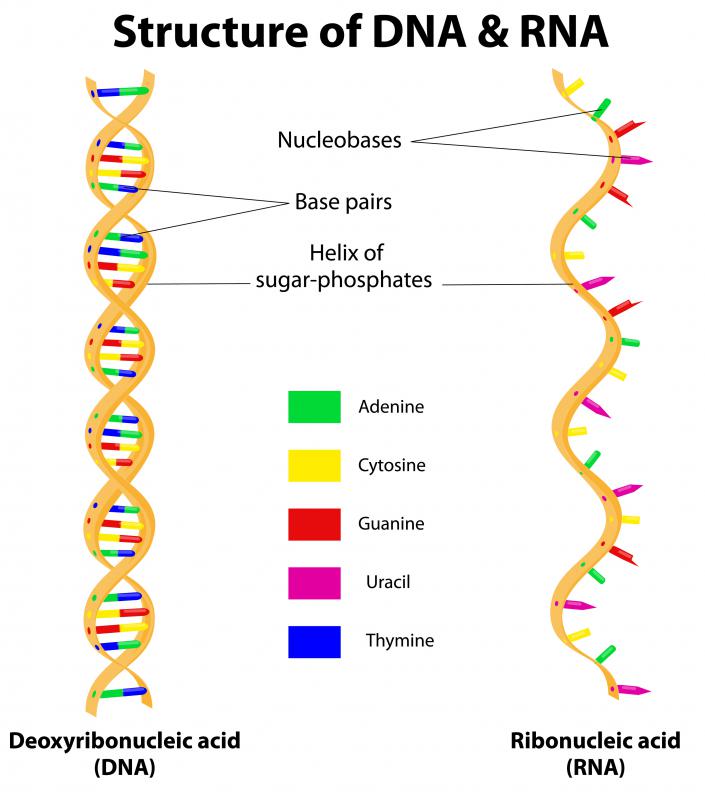At WiseGEEK, we're committed to delivering accurate, trustworthy information. Our expert-authored content is rigorously fact-checked and sourced from credible authorities. Discover how we uphold the highest standards in providing you with reliable knowledge.
What is Molecular Cell Biology?
Molecular cell biology is a branch of biology which is a relatively new field compared to other fields of study. Scientists who study this field study the structure and properties of molecules found within cells. This field is often closely linked with biochemistry, in which the chemical reactions of biological molecules are looked at. The difference between biochemistry and molecular biology is that biochemists study molecules separately from the rest of the organism, whereas molecular biologists look at the interactions of molecules.
Molecular cell biology dates back to the 1930’s, when Warren Weaver coined the term molecular biology. Based on advances in fields such as X-ray crystallography, Weaver felt that biology as a whole was about to undergo some great changes. In fact, biology can basically be split into two groups – organism biology and molecular or cellular biology. This split is based on whether organisms are studied as a whole or if single cells are looked at.

The chief concern of molecular biologists is understanding how the various systems of the cell interact with one another. In other words, molecular cell biology is the study of how cells work based on the molecules found within them. The interaction of molecules found within cells underlies what type of cell will be formed and what role it is to play. In particular, the processes involved with the genetic material of cells, including replication, transcription and translation, are sought to be understood to provide a clearer picture of their regulation within cells.

Key molecules that are studied by molecular cell biologists include DNA, deoxyribonucleic acid, RNA, ribonucleic acid, and proteins. DNA is of interest as it is the molecule that carries the genetic information of the cell, and thus the organism. RNA, which is closely related to DNA, carries the genetic information from the nucleus out to the rest of the cell. Finally, proteins are created based on the genetic information found in the DNA. These proteins determine the cell type and function based on the enzymes that are created.

Specific techniques are used in the molecular cell biology field. These techniques allow molecular cell biologists to isolate, characterize and manipulate the different molecules found with cells. Examples of techniques used by molecular cell biologists include expression cloning, gel electrophoresis, Western Blot and Southern Blot. Each of these techniques has a specific role to play in allowing scientists to study the important molecules that form the basis for life.
AS FEATURED ON:
AS FEATURED ON:














Discussion Comments
@anon44735 - I'm not sure what you mean? There are a lot of techniques used in molecular pathology. That just means the study of pathogens at a molecular level. They might study them under microscopes, or infect cells with them and study the results. They might use radiation, or staining or any number of things.
And then they might try different techniques to kill or manipulate the pathogens.
It really depends on what you want to find out. While molecular cell biology is a young science and it seems like a very difficult one in which to achieve anything, given the limitations of size, it's really cool how much people actually know and can do to find out more.
You might want to check out a molecular cell biology textbook if you want a more specific answer.
Personally I'm more interested in organism biology, but I am still fascinated by molecular biology. I just don't like the extra chemistry that comes with it.
I think when most people think of molecular biology they think of people peering into microscopes and just studying what happens there. Which is how I pictured it.
But it seems to be mostly a matter of chemistry. Often it involves chopping up cells and then testing them to see what happens, or applying stains and things to them, or growing them carefully.
I admire people who do it, but I'd rather work with live plants or animals any day. I have much more patience with something like that.
which technique is used in molecular pathology?
Post your comments